|
|
Posted 3/5/2012 (link)
 Over the past two years, we've been able to bring you a wide variety of audio and video from the fruitful and long-running collaboration of poet Susan Howe and musician/composer David Grubbs (Squirrel Bait, Bastro, Gastr del Sol) and today we're happy to present footage of a recent performance of their latest piece, Frolic Architecture, recorded at Harvard University on November 1, 2011.
The stunning center section of Howe's latest book, 2011's That This (New Directions, 2010), Frolic Architecture was "inspired by Susan Howe's experience of viewing various manuscripts, sermon notebooks, books, and pamphlets of the eighteenth century American Calvinist theologian Jonathan Edwards in the vast collection of Edwards family papers at the Beinecke Rare Book and Manuscript Library in New Haven, Connecticut. Especially by the folder in Box 24 titled 'Wetmore, Hannah Edwards, 1713?1773, Diary, 1736?39, copy in the hand of Lucy Wetmore Whittelsey, with commentary/n.d.'" The texts were composed "using multi-purpose copy paper, scissors, 'invisible' scotch tape, and a Canon copier PC170 [to] collage fragments of this 'private writing' with a mix of sources from other conductors and revealers in the thick of things — before." Howe and Grubbs released a studio version of Frolic Architecture on Drag City subsidiary Blue Chopsticks (home to their previous albums, 2008's Souls of the Labadie Tract and 2005's Theifth) last August, which further develops the collaborative nature of the piece — aside from Howe's appropriation of Hannah Edwards Wetmore's diary, Frolic Architecture was originally published as a limited-edition artist's book by Grenfell Press, featuring ten photograms by James Welling (also reproduced in That This).
Working in a similar mode to their earlier collaborations, Grubbs creates an airy and haunting bed of sound, consisting of laptop manipulations of Howe's pre-recorded voice — rhythmic and chaotically scattered phonemes that mimic the poem's collaged scraps and flutter around the poet's live performance — wed to modulated Hammond organ drones. Much like Souls of the Labadie Tract, the two artists' interaction on Frolic Architecture began at a very early and unpublished stage in the text's development, and as Howe acknowledges in the Q&A session that follows the performance, her association with Grubbs has shaped her approach to writing and language in general. While, at first, she deemed Frolic Arcitecture to be an "unperformable poem," Grubbs' efforts to "match [his] fragmentation to [her] fragmentation" yield fantastic results once again.
Posted 3/7/2012 (link)
 We've just added audio from the launch event for C.T. Funkhouser's newly-released volume, New Directions in Digital Poetry (Continuum, 2012), recorded February 5, 2011 at the Bowery Poetry Club. Several authors whose works are highlighted in the book — Alan Sondheim, Francisco J. Ricardo (who edits Continuum's series in and wrote New Directions in Digital Poetry's Introduction), Angela Ferraiolo, John Cayley, Mary Flanagan, and Stephanie Strickland — made presentations at the event.
Sondheim opened the show with a musical performance, playing cobza with Azure Carter (vocals), Chris Disparra (baritone sax), and Funkhouser (flute). Funkhouser spoke about writing the book, and Ricardo shared his reflections about the volume's preparation and significance. Angela Ferraiolo screened her video subway (2011). John Cayley read a poem concerning the reign of Google titled "Pentameters Toward the Dissolution of Certain Vectoralist Relations" (2011). Mary Flanagan performed her works [theHouse] (2006) and [xyz] (2009). Strickland (accompanied by Funkhouser) read from her eco-poetic collaboration with Nick Montfort, Sea and Spar Between (2011).
In addition to recordings of these sets, Funkhouser has provided external links to many of the texts read, along with a gallery of photos from the event and a link for further information on the volume. Our New Directions in Digital Poetry page joins our page for his 2008 Machine series lecture at the Kelly Writers House, "IBM Poetry: Exploring Restriction in Computer Poems" as exemplars of his groundbreaking critical work. Don't forget, however, that you can also hear plenty of recordings of his poetic and musical output on his PennSound author page and browse recordings from his extensive archives on our Funkhouser recordings page
Posted 3/9/2012 (link)
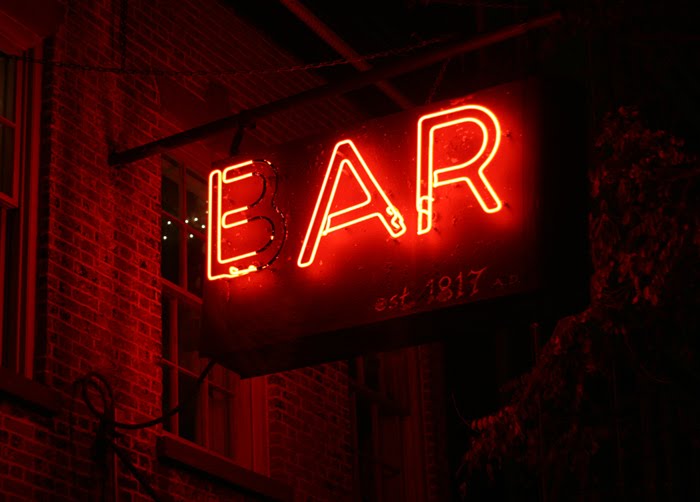 Here's something to keep you happily occupied this weekend (or for the next few months): today PennSound co-director Charles Bernstein announced the release of more than one hundred early-to-mid-1990s recordings from the Ear Inn on Jacket2. Some of the names included in this avalanche of new audio: Cabri, Child, K. Davies, A. Davies, Derksen, Dewdney, DiPalma, DuPlessis, Farrell, Fitterman, Fodaski, Foster, Fyman, Gander, Gizzi, Goldsmith, Frim, Heller, Hixon, Hoover, Inman, Kalendeck, Killian, A. Kim, Kocik, Kraut, Levy, Lewis, Lubeski, Lusk, Lyons, Mac Low, Matthews, Messerli, Myles, Neilson, O'Brien, Pearson, Price, Raworth, Regan, Rettallack, Richard, Roberson, Rosenfeld, Rower, Sala, Shaw, Sirowitz, Smith, Tillman, Toscano, Venuti, K. Waldrop, R. Waldrop, Wallace, Wheeler, C.D. Wright, J. Williams, Ziolkowski, Zivancevic, Zurawski.
In his J2 post, Bernstein relates a little of the Segue Series' history at the Ear Inn, its first home: The Ear Inn, a small bar on Spring Street near Tribeca (just before it turns into the Hudson River), has been the home of arguably the best reading series in New York City over the past two decades. Ted Greeenwald and I started the Saturday afternoon series in the Fall of 1978 with a reading by John Ashbery and Michael Lally. Over the many Saturdays that followed, the audience has shifted in size, the PA system has worked and had conked out, the noise from the bar has sometimes become intrusive.
But the commitment to a continuing renewal of the art of poetry has never faltered; a commitment, that is, to a spectrum of writing that places its attention primarily on language and ways of making meaning, that takes for granted neither vocabulary, grammar, process, syntax, program, or subject matter — indeed where all these dynamics remain at play.
Over the years, the Ear Inn series has been able to retain its vitality because of the energy and judgment of the poets who have curated the program, for sometimes just a month and for sometimes several years; in particular Mitch Highfill, Jeanne Lance, Andrew Levy, Rob Fitterman, Laynie Brown, James Sherry of the Segue Foundation, George Peck of the Ear Inn have all been crucial to keeping the series going. George Peck, "long-time barkeep at the Ear" and "a huge support for the series over the years" also plays an important role in the release of these new recordings, sharing a box of his own tapes with PennSound that complement the recordings taken from Bernstein's own archives. Last, but by no means least, special thanks go out to the inimitable Jeff Boruszak, who tirelessly digitized, edited and organized this treasure trove of recordings.
So that these newer additions won't get lost amidst the hundreds of recordings already posted on our main Ear Inn page, we've created a separate index for your browsing pleasure.
Posted 3/13/2012 (link)
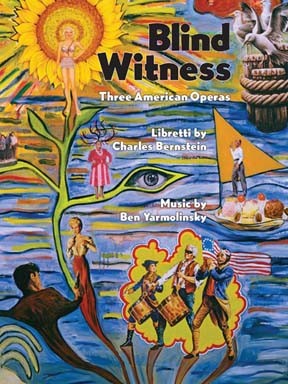 Today, we're highlighting new videos for Charles Bernstein and Ben Yarmolinsky's early-90s operatic collaborations. Augmenting the audio recordings of the original productions and video from a 2008 launch event for Factory School's collection of Bernstein's libretti, Blind Witness: Three American Operas, already archived on Yarmolinsky's PennSound author page — you can read the original announcement of those recordings here — we now have complete videos of the original productions of The Subject (1991) and The Lenny Paschen Show (1992), and an excerpted promotional video for Blind Witness News (1990).
In a recent post on Jacket2 announcing the new videos, Bernstein reprinted Yarmolinsky's preface to the Factory School volume in its entirety, and this resource, along with a New York Times review of Blind Witness News are also linked on the PennSound page. Here's Yarmolinsky describing how he came to work with Bernstein after being commissioned by Grethe Holby of American Opera Projects to write what would become Blind Witness News: The next question was who would write the libretto. With only about three months until the scheduled performance, I thought I'd better farm the job out. I remembered the name of Charles Bernstein. The summer before in Tangier, my friend Rodrigo Rey Rosa had mentioned him to me as the leader of the L=A=N=G=U=A=G=E poetry movement — a movement about which I knew nothing. Still, it sounded intriguing, and I knew that Charles lived in New York. So, I looked up all the Charles Bernsteins in the phone book and hit on the right one after a few tries.
Charles was immediately receptive to the idea of writing the libretto and we met a few days later to talk it over. By the end of our first meeting we had decided on a cast of four singers: Jack James & Jill Johns — anchorman and woman respectively, Jane Jones — weatherwoman, and John Jacks — sportscaster. We also decided on a four-part format of International News, Local News, Weather and Sports. My original title for the piece was "News Songs," but Charles felt that this title was — in his words — "too bland." I deferred to his judgment. Looking back on the three operas, nearly twenty years later, he concludes, "These three operas (if they are operas) from the early 1990s represent my ideas about how contemporary American English ought to be sung. There is a consistent attempt in the text-setting to follow the rhythms and cadences of our language as it is spoken. Although I collaborated on the scenarios, suggested some verse forms, occasionally asked for slight changes to the original text, and sometimes asked for a second verse or a refrain, ultimately, the music was evoked by the words."
Posted 3/15/2012 (link)
 Back in January, we announced new PennSound Classics recordings from UPenn professor emeritus, John Richetti — selected poems from both John Milton and Andrew Marvell — and today he's back with two new sets of readings.
First, we have a set of twenty-five poems from John Donne, taken from John Hayward's Donne: Complete Verse and Selected Prose (the Nonesuch Press, 1967). Along with well-known poems like "The Flea" and "A Valediction: Forbidding Mourning," you'll also find titles including "Go and Catch a Falling Star," "Loves Deitie," "A Lecture upon the Shadow" and "The Indifferent," along with a selection of seven of Donne's Holy Sonnets.
Joining these new recordings, we have a new author page for George Herbert (shown above at left), featuring nineteen selections chosen from Arthur Waugh's The Poems of George Herbert (Oxford University Press, 1958). Here, you'll find readings of "Redemption," "The Church Floor," "Vanite," "Vertue," "The Pearl" and "The Forerunners," among others.
For seven years now, Richetti has been making recordings of British poets for PennSound. In addition to the four authors mentioned above, don't miss his earlier sessions, including recordings of Pope, Swift and Dryden, his selections from Paradise Lost, selections from Shakespeare's sonnets and perhaps his most impressive contribution, The PennSound Anthology of Restoration & 18th-Century Poetry. All of those pages, along with many more, are gathered on our PennSound Classics homepage.
Posted 3/20/2012 (link)
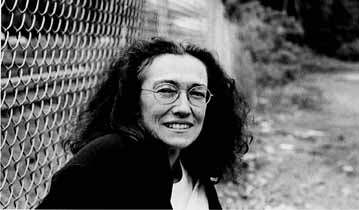 Our latest author page — for poet and Telephone Books editor Maureen Owen — is already receiving an enthusiastic response from the poetry community.
This new archive of Owen's recorded work includes eight complete readings spanning five decades. Her two most recent volumes, Edges of Water (Chax Press, 2012) and Erosion's Pull (Coffee House Press, 2006) are well represented in readings at the St. Mark's Poetry Project (in 2011), POG Sound (2007), the Belladonna* Reading Series (2007 and 2000) and at the Kelly Writers House (2004). These sets are joined by vintage readings from SUNY-Buffalo (in 1985) and the Segue Series' original home, the Ear Inn (from all the way back in 1978), and our collection concludes with video of Owen's 1978 appearance on Public Access Poetry, alongside Robin Messing.
While this page is long overdue, we couldn't be happier to finally have it as part of the site. Click on the title above to start exploring.
Posted 3/22/2012 (link)
 Today we're highlighting two recently-added recordings from the inimitable Anne Waldman.
First up, we have a February 29th video from our own Kelly Writers House, where Waldman delivered a talk on "Poetic Symbiosis" as part of the Sylvia Kauders lunch series. After opening statements from Jessica Lowenthal, CAConrad introduce Waldman, framing the poet's political and poetic interoperability as embodying the role of "outrider" (borrowing from the title of one of her books). The proceedings are split between Waldman discussing her own poetic process and the influences that shape it, and a lengthy Q&A session where she interacts with the audience in a more discursive fashion.
We've also recently added new audio from last December, recorded at the annual Belladonna* benefit reading at New York's Hi! Art Gallery, where she was joined by her son, Ambrose Bye. You can hear both of these recordings — and many, many more — on PennSound's Anne Waldman author page, and stay tuned for a new PoemTalk podcast featuring Waldman (recorded on the same day) in the near future.
Posted 3/26/2012 (link)
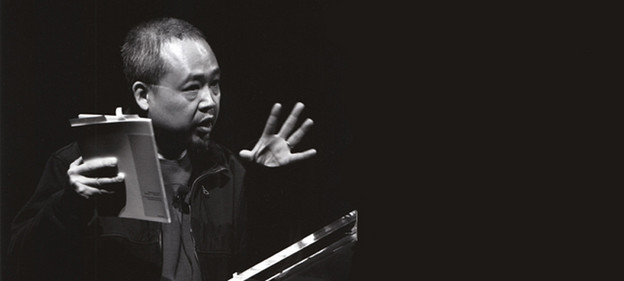 Today, we're releasing the fifty-first episode in the PoemTalk Podcast Series. Here's host Al Filreis' write-up of the new show from the PoemTalk blog on Jacket2:
Linh Dinh playfully and bitterly engages food, war, and race in a poem called "Eating Fried Chicken." The poem appeared in his book American Tatts, published by Chax in 2005. For PoemTalk's 51st episode, Tom Devaney, Susan Schultz (visiting from Hawai'i), and Leonard Schwartz (visiting from Olympia, Washington) joined Al Filreis to talk about this work of apparently straightforward address yet tonal complexity.
During the discussion Tom especially wrestles with the problem of tone. There's plenty of humor in the poem, he notes, but one can also read the speaker as a person who has "taken all the trouble inside of him and he's internalized it." Thus the "debts you owe me" — debts presumably the "brother" of line 1 owes the speaker — remind Tom of a tonal double strategy (particularly on questions of race) that Linh Dinh has learned from the early Amiri Baraka (LeRoi Jones) and from Etheridge Knight: "going on the offensive," as Tom puts it, "and yet implicating himself fully."
Pressing his reading of the poem's antagonist as a Vietnam War veteran, Al asks someone to describe how matters of family, honor, country (and "blood") pertain to food, whereupon Susan, thinking about Hawai'i, notes Asian American funerary practice which entails bringing comestibles to the deceased. Dinh doesn't want to be marked, she says, as an Asian American writer per se but "he's willing to play with that identification between food and identity precisely to call it into question." "'I dare you,'" Al summarizes, "'to make me mean something by what I eat.'" So what in the poem is the significance of the crispy chicken as alluringly "fast," so alluring as to disallow expectation and erase memory? Leonard observes that here Dinh is a poet who "steps from the street into the curb" and "looks down at formless stuff, and picks it up and starts playing with it" in the (modernist) tradition of Walter Benjamin (the "ragpicker who collects urban detritus only to turn it into poetry" — a key phrase from The Writer of Modern Life: Essays on Charles Baudelaire), except that here, in Dinh's world, the supposed junk "has been manufactured to look like that," as Leonard puts it, "manufactured to appear formless, junk in its very origins." And so junk food is obviously part of the aesthetic of the poem.
Clearly this is an occasion when the speaker is ostentatiously yet blithely willing to lick and consume food that is "not generally available to mankind." But "there are also times" when he (on principle? because of his sense of racial and international justice? because of a traumatic experience with people in war?) will "refuse" this easy, thoughtless gluttony. Such an ethical stance then puts his poem in mind of the scarcity of fresh food — the apples of line 12 — and of the riots non-ritualized (literal) privation causes. Yet, again, the showiness of the speaker's consumption in the first lines of the poem carries the intrepid but blithe conversationalism of the language all the way through until the very end when the breathing of the poet brings him up short, for the air enabling these utterances conjures the memory of war, from which eating fried chicken is presumably a great distance: lungs of "gun powder and smoke." Listen very closely to this audio recording — turn the volume way up — and you should be able hear Linh Dinh's special kind of breathing: a subtle although very basic form of urgency.
Dinh's PennSound page includes several performances of "Eating Fried Chicken." The recording we used was made during an extensive "Studio 111" reading in Philadelphia in December of 2007. We invite PoemTalk's audience to compare the nuanced ethical tone of this poem with those of several other American Tatts works performed at the same time: "Sudden Death Overtime" and "Bearings," for example. And for the context of Linh Dinh's critique of commodification and political power — and for a sense of his recent movement somewhat away from poetry — we recommend the hour-long talk he gave at the opening event launching an exhibit of his photographs in January 2011 and also his ongoing photographic blog, State of the Union.
The editor of this episode of PoemTalk was, as always, Steve McLaughlin. PoemTalk is a co-production of PennSound, the Kelly Writers House, Jacket2 and the Poetry Foundation. If you're interested in more information on the series or want to hear our archives of previous episodes, please visit the PoemTalk blog, and don't forget that you can subscribe to the series through the iTunes music store. Thanks, as always, for listening!
Posted 3/28/2012 (link)
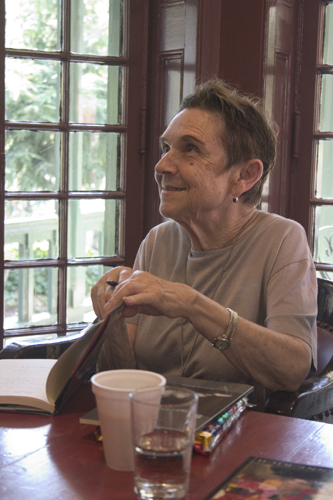 It's a very sad day in the world of poetry, as the Los Angeles Times reports that Adrienne Rich has died at the age of 82 from complications of long-term rheumatoid arthritis.
It would be difficult to list all of the accolades that Rich accumulated in the more than sixty years since her debut collection, A Change of World, was chosen by W.H. Auden for the Yale Younger Poets Award in 1950, but they include a Guggenheim Fellowship (1952), the National Institute of Arts and Letters Award (1960), the Poetry Society of America's Shelley Memorial Award (1970), the National Book Award (for Diving into the Wreck, 1974), the Poetry Foundation's Ruth Lilly Poetry Prize (1986), admission to the American Academy of Arts and Sciences (1991), the Lenore Marshall Poetry Prize (1992), the Frost Medal (1992), a Academy of American Poets Fellowship (1992), a MacArthur Fellowship (colloquially known as the "genius grant," 1994), the Wallace Stevens Award (1996), the National Medal of Arts (1997), and the Griffin Poetry Prize Lifetime Recognition Award (2010). Among these, it is perhaps the penultimate honor that is the most important, as Rich refused it, citing the government's hostile policies towards culture. "I could not accept such an award from President Clinton or this White House," she stated, "because the very meaning of art, as I understand it, is incompatible with the cynical politics of this administration . . . The radical disparities of wealth and power in America are widening at a devastating rate. A president cannot meaningfully honor certain token artists while the people at large are so dishonored"
This impassioned gesture serves as one very public and high-profile culmination of the process of radicalization that began in the early 1960s, as Rich, along with the nation at large, underwent tremendous cultural, political and social transformation. These preoccupations — the rights of women, the civil rights movement, stopping the war in Vietnam (and others since), ending poverty, and championing queer identity — were freely espoused in a number of celebrated volumes, including Leaflets, The Will to Change, Diving into the Wreck, A Wild Patience Has Taken Me This Far and An Atlas of the Difficult World, and also in a prodigious body of non-fiction writing, where Rich found a second life as a groundbreaking feminist theorist. These deeply-held beliefs only grew stronger in the new millennium, where Rich faced troubling political times with a strong faith in poetry's remediative powers. Writing in The Guardian in 2006, she evoked Shelley's oft-quoted appraisal of poets as "the unacknowledged legislators of the world," observing "I'm both a poet and one of the 'everybodies' of my country. I live with manipulated fear, ignorance, cultural confusion and social antagonism huddling together on the faultline of an empire." These sentiments were explored masterfully in later volumes such as Fox, The School Among the Ruins, Telephone Ringing in the Labyrinth and her latest collection, Tonight No Poetry Will Serve, and while Rich is often hailed as an exemplary feminist poet, or queer poet, or political poet, perhaps now we can all agree that we've lost an extraordinary (but otherwise adjective-less) poet.
You can listen to a variety of recordings spanning four decades on PennSound's Adrienne Rich author page, which is anchored by audio from the poet's 2005 visit to UPenn as a Kelly Writers House Fellow. In addition to the segmented tracks from her reading and morning conversation with Al Filreis, you'll also find a 2000 reading from SUNY-Buffalo, a 1985 set from Cornell University and an unidentified recording from 1974. Rich was also the subject of the second episode of the PoemTalk Podcast series, as well as PennSound Podcast #11.
|
PennSound Daily archive
2025
2024
2023
2022
2021
2020
2019
2018
2017
2016
2015
2014
2013
2012
2011
2010
2009
2008
2007
|








